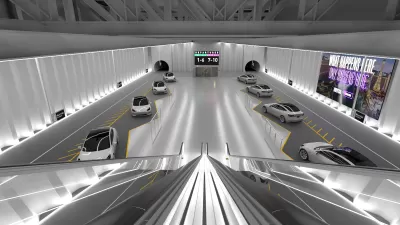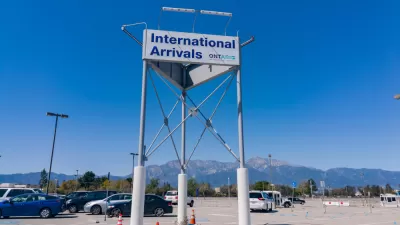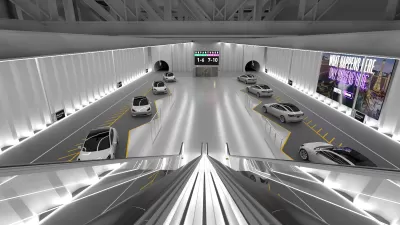Elon Musk’s promised solution for congestion—the Boring Co.—has proven most successful at disappearing on the governments that trusted them.

Ted Mann and Julie Bykowicz write in a paywalled article for the Wall Street Journal about the track record of the Boring Company in delivering on its boasts:
The six-year-old company has repeatedly teased cities with a pledge to “solve soul-destroying traffic,” only to pull out when confronted with the realities of building public infrastructure, according to former executives and local, state and federal government officials who have worked with Mr. Musk’s Boring.
The list of cities burned by Boring expectation includes Chicago, Maryland, Los Angeles, and Ontario, California. Meanwhile, the one city with evidence of the Boring Company’s work is Las Vegas. “There, Teslas with hired drivers ferry convention-goers through neon-lit white tunnels at speeds of about 30 miles an hour,” according to the article. The reports of the Las Vegas tunnels have been far less diplomatic.
The experience of Ontario is particularly informative for the article, noting that the city has responded to increased traffic to and from the Ontario International Airport by planning a $1 billion “street-level rail connection” between the airport and a commuter train station 4 miles away. “For just $45 million, Mr. Musk’s Boring Co. offered to instead build an underground tunnel through which travelers could zip back and forth in autonomous electric vehicles,” according to the article.
The San Bernardino County Transportation Authority reached a preliminary $45 million deal with Boring reached in in February 2021, before revising the cost estimate for the project to $500 million in late 2021. “The authority asked for a third-party environmental review, required by state law, of the Boring proposal’s impact, records show,” write Mann and Bykowicz. “That’s when the process came to a halt.”
Additional anecdotes and documented history from Las Vegas and Maryland are also provided in the paywalled source article below. Despite the track record of failures, other jurisdictions around the country appear poised to repeat the same mistakes, including, according to the article, Fort Lauderdale and North Miami Beach. Ontario is still moving forward with the tunnel idea, and, according to the article, would still welcome a bid from the Boring Co.
FULL STORY: Elon Musk’s Boring Company Ghosts Cities Across America

Planetizen Federal Action Tracker
A weekly monitor of how Trump’s orders and actions are impacting planners and planning in America.

Maui's Vacation Rental Debate Turns Ugly
Verbal attacks, misinformation campaigns and fistfights plague a high-stakes debate to convert thousands of vacation rentals into long-term housing.

San Francisco Suspends Traffic Calming Amidst Record Deaths
Citing “a challenging fiscal landscape,” the city will cease the program on the heels of 42 traffic deaths, including 24 pedestrians.

Amtrak Rolls Out New Orleans to Alabama “Mardi Gras” Train
The new service will operate morning and evening departures between Mobile and New Orleans.

The Subversive Car-Free Guide to Trump's Great American Road Trip
Car-free ways to access Chicagoland’s best tourist attractions.

San Antonio and Austin are Fusing Into one Massive Megaregion
The region spanning the two central Texas cities is growing fast, posing challenges for local infrastructure and water supplies.
Urban Design for Planners 1: Software Tools
This six-course series explores essential urban design concepts using open source software and equips planners with the tools they need to participate fully in the urban design process.
Planning for Universal Design
Learn the tools for implementing Universal Design in planning regulations.
Heyer Gruel & Associates PA
JM Goldson LLC
Custer County Colorado
City of Camden Redevelopment Agency
City of Astoria
Transportation Research & Education Center (TREC) at Portland State University
Jefferson Parish Government
Camden Redevelopment Agency
City of Claremont





























